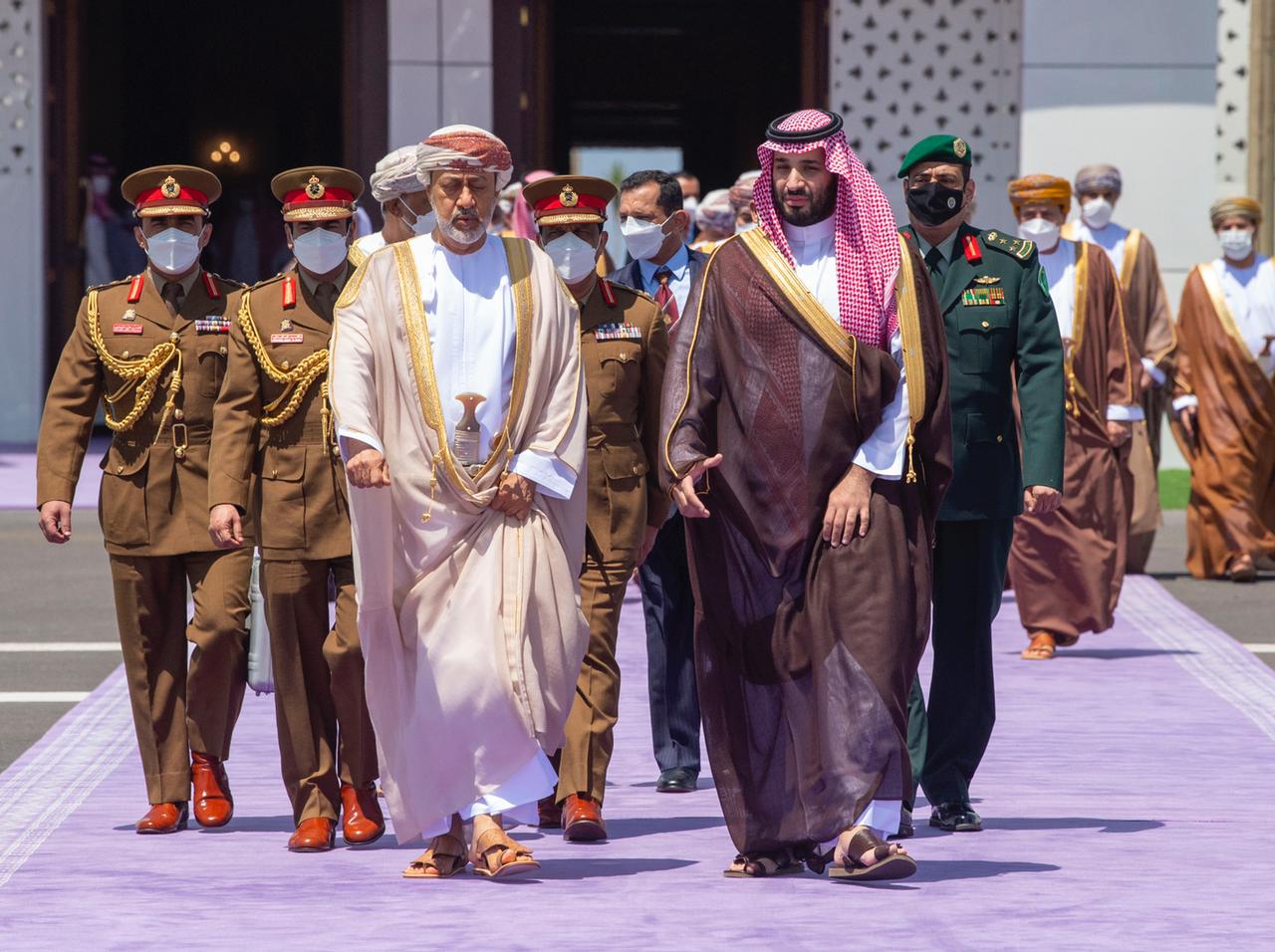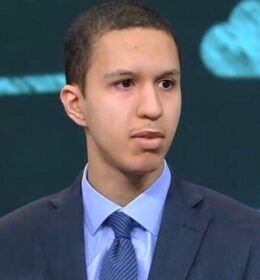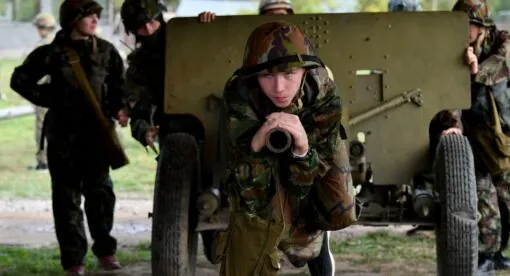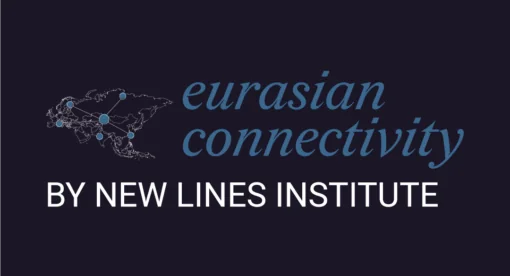Increased economic and security cooperation between Riyadh and Muscat is unlikely to lead to a deepening of relations between the kingdom and the sultanate.
A July visit by Omani Sultan Haitham bin Tariq to Saudi Arabia marks a rapprochement between the two countries, with the possibility of increased economic and security cooperation, especially with regards to the Yemeni civil war. However, this improvement in ties is unlikely to lead to a deeper relationship or signal an end to Oman’s “positive neutrality” foreign policy, particularly with respect to Iran.
Given its strategic location in the Strait of Hormuz, Oman has long had a unique relationship with Iran, which has allowed it to be a diplomatic bridge connecting Tehran to both the Arab world and the West. Muscat believes that deterring Iran should come through de-escalation and is aware that its interests are best served by remaining neutral. This approach insulates the sultanate somewhat from the effects of regional conflicts, a vital consideration for its stability as it faces a frail economic situation. As instability in the region threatens to spill across borders, Oman’s diplomacy can play a role in bringing tensions down. This approach helps establish Muscat as a trusted broker on the international stage, but perceptions of bias could damage its credibility as an honest mediator.
History of Omani-Saudi Ties
While both Oman and Saudi Arabia are members of the Gulf Cooperation Council (GCC), established in 1981 in response to the revolution in Iran that brought the current regime to power, bilateral relations have never been particularly close, with the sultanate choosing to pursue an independent foreign policy compared to other countries in the region. For instance, despite pressures from the Saudis and others, the sultanate declined to take sides against Iran.
Indeed, when the Iraq-Iran War began, Haitham’s predecessor, Qaboos bin Said, allowed Iraq to use Omani bases to attack Iran but reversed his stance at the United States’ request. Oman largely remained neutral during the conflict and preserved its ties with both Baghdad and Tehran, a decision that held even when Saddam Hussein invaded Kuwait in 1990; Oman participated in the United Nations liberation effort, but did not follow Saudi Arabia in severing diplomatic relations with Iraq. Meanwhile, it retained ties with Kuwait.
More recently, Oman has distanced itself from the conflicts and tensions in the Middle East that resulted from the turmoil of the aftermath of the Arab Spring. For instance, it did not support then-Saudi King Abdullah bin Abdulaziz’s call for forming a Gulf Union, nor did it participate in the Saudi-led coalition in Yemen or join Saudi Arabia, the United Arab Emirates, Bahrain, and Egypt in boycotting Qatar. Oman was one of the few countries in the Arab world that did not cut diplomatic ties with Syria during the country’s civil war, and it maintained ties with Iran despite Saudi Arabia and others severing relations with Tehran five years ago.
Because of this neutrality, Muscat’s role as a mediator became even more significant. For example, Oman facilitated secret U.S.-Iranian talks prior to Joint Comprehensive Plan of Action (JCPOA) negotiations, an engagement that angered Saudi Arabia because it was held without Riyadh’s knowledge. In late 2016, King Salman bin Abdulaziz visited the UAE, Qatar, Bahrain, and Kuwait in a Gulf tour, but excluded Oman, which indicated a cooling of Riyadh-Muscat ties.
But Oman also has maintained its approach of balance between Saudi Arabia and Iran. One example is its decision to join the Saudi-led Islamic Military Alliance to Fight Terrorism, which aimed to form a front both against terror groups such as the Islamic State and against Tehran.
This balanced approach is partially because Qaboos, who died in January 2020 after a nearly 50-year reign, trusted neither Riyadh nor Tehran. “Qaboos harbored a very healthy suspicion of both the Saudis and the Iranians. Neither ever managed to bully him, and he would often make a point of standing up to them,” a former senior Western official told this author. The official said Qaboos “relented a bit” after the GCC offered Oman a $10 billion aid package in 2011 during the Arab uprising, funded mostly by the Saudis, but this does not mean that Qaboos, who had an exceptional understanding of the region, abandoned his balancing-act approach. “[Haitham] will have to chart his own course, but I suspect for the near term, there will likely be little change,” the official said. “I would expect both the KSA and UAE to court him eagerly and apply some pressure as well.”
In Yemen, where Oman is on good terms with both the government and al-Houthi rebels, it has pursued a positive diplomatic role, including hosting direct talks between the rebels and the United States. Omani policymakers view Riyadh’s intervention as a mistake and dismiss the narrative that portrays the Houthis as Iranian puppets. Instead, they see the group as part of Yemen’s community.
Oman and Saudi Arabia have competed on the ground in Yemen, specifically in Al Mahrah, Yemen’s easternmost governorate, which shares borders with both countries. Oman, which perceives the province within the sultanate’s sphere of influence, has traditionally provided Mahris with humanitarian support and dual nationalities. In 2017, the Saudis dispatched troops to the governorate. While this was a move Oman sought to undermine, it still did not deploy any of its troops to Al Mahrah.
Protentional Rapprochement Reasons
Haitham’s visit to Saudi Arabia, his first trip abroad since ascending to the throne in January 2020 after the death of Qaboos, shows a thawing of relations between the two countries. Haitham met with King Salman bin Abdulaziz and Crown Prince Mohammed bin Salman, the kingdom’s de facto ruler, and the countries signed a memorandum of understanding establishing an Omani-Saudi Coordination Council, with the aim of coordinating political, security, economic, and other relations. Saudi officials were also authorized to prepare and sign draft agreements with the sultanate in many fields.
As a relatively new head of state who wants to make his own mark, Haitham may well be willing to improve Omani-Saudi relations. His visit came after recent protests over poverty and unemployment in the sultanate. Indeed, Oman stands to benefit economically from improved relations with Saudi Arabia, and vice versa, especially regarding the possibility of the two countries linking an oil pipeline that goes to the Arabian Sea.
It also is believed that the two sides discussed Yemen’s war and Iran’s nuclear deal. While the Saudi-led coalition failed to restore Yemeni President Abd-Rabbuh Mansour Hadi’s government after over six years of intervening, it seems willing to consider removing itself from the quagmire it has put itself in. Since Oman has proven itself as a trusted mediator in the region and has relations with the various parties involved in the conflict, Riyadh may well seek Muscat’s help in finding an exit strategy. For Oman, playing a constructive role in Yemen goes in line with the sultanate’s balanced diplomatic approach to regional matters and reduces the regional insecurity in its immediate neighborhood.
Lately, the Saudis have been increasingly backing the sultanate’s diplomacy in Yemen. In March, the state-run Omani news agency reported that the sultanate is working with Saudi Arabia, the U.N., and the U.S. for a political solution to the war. For Muscat, having Riyadh’s support is important as it elevates the significance of Oman’s diplomatic role in the Yemeni file.
Moreover, should Omani-Saudi ties improve, their rivalry in Al Mahrah may well subside. Yemeni journalist and political analyst Abdul Hakim Helal told this author, “Over the weeks that followed Sultan Haitham’s visit to Saudi Arabia, it seemed as if the tension between Riyadh and Muscat in Al Mahrah has witnessed a decrease on the ground. However, it cannot be certain this will continue forever.” Helal, who is the author of a recently published study on the Saudi-Omani rivalry in Al Mahrah, said, “The tension between the two countries in the governorate led to great tribal, social, and political polarization since Saudi Arabia established a military presence in the governorate in 2017. This makes controlling it not an easy task.”
Oman also could use its status to improve Saudi-Iranian relations. The Saudis still cast doubt on Iran and the JCPOA and would like to be part of the talks despite Iran’s refusal of new participants. The two have previously held talks in Iraq over Yemen, a diplomatic accomplishment for the Iraqi government, but Oman’s greater experience, stability, and relations with Tehran will likely play a more substantial role in any Saudi-Iranian negotiations.
Haitham’s visit came soon after the emergence of news about a Saudi-UAE rift over OPEC. As a result, Saudi Arabia may be seeking to expand its regional alliances by getting closer to Oman. While Riyadh and Abu Dhabi diverge on other issues, such as Yemen, it remains to be seen if the Omani-Saudi rapprochement will have an impact on the sultanate’s ties with the UAE. As the former senior Western official put it, “Watch what happens on the Oman-UAE front, another relationship in need of repair work.”
Thus, it appears to be in the current interests of both Muscat and Riyadh to have closer ties. However, it is difficult to see the two sides move beyond a tactical relationship, considering that the factors shaping the rapprochement will not offset their respective strategic imperatives.
Abdulaziz Kilani is a British Arab writer and researcher who focuses on the Middle East and North Africa. He tweets as @AZ_Kilani.
The views expressed in this article are those of the author and not an official policy or position of the Newlines Institute.







